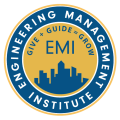In this session of The Engineering Career Coach Podcast, I am going to take you inside the Engineering Career Summit which is the event that Chris and I threw in Washington DC in early May and will be throwing again in May 2016 in New Orleans, Louisiana. I am going to play for you an audio recording of one the Engineering Career Summit sessions entitled Engineering Leadership by Pat Sweet, P. Eng.
In the Take Action Today segment, at the end of the show, I give you an approach on how you can apply your leadership skills in your career and life.
Pat Sweet is a Professional Engineer working in Ontario, Canada as a product manager in the rail industry. He’s also the author behind the Engineering and Leadership blog, where he shares his thoughts and experiences on leadership, productivity and career advice for engineers.
Listen to this session and learn what engineering leadership is and is not and the two models of leadership:
What engineering leadership is NOT:
- Leadership is not management
- Leadership is not charisma
- Leadership is not technical master
- Leadership is not something you’re born with
- Leadership is not meant for senior professionals
What engineering leadership IS:
- Leadership is important for engineers
- Leaders can change the world, make the organization stronger and have a better career
- Leadership can be developed, learned and perfected
Models of Engineering Leadership:
Transformational leadership – transforming the people around you and getting people to want to do what you want them to do
4 key components of transformational leadership:
- Idealized influence – be a role model
- Inspirational motivation – inspiring and motivating others to take action
- Individualized consideration – taking a genuine interest in people
- Intellectual stimulation – encouraging others to be innovative and creative
Servant leadership – desire to serve people first; the leader is at the bottom serving the needs of the organization, facilitating them to achieve the mission and vision
9 key attributes of servant leadership: Vision, Honesty, Integrity, Trust, Service, Modeling, Pioneering, Appreciation, Empowerment
Three elements of engineering leadership:
- Be a role model – know who is your role model(s) that best fit the criteria of leaders and adapt their traits
- Inspire others – establish your compelling vision and bring someone along
- Be selfless – your needs and ambitions are oriented toward the service of others
Books mentioned in this session include:
Strengths Finder by Tom Rath
Resources and links mentioned in this session include:
Engineering Career Summit
Engineering and Leadership
Click Here for Session #64 Transcription
Sponsor for this session:
PPI2Pass Review Courses for FE Electrical and Computer Exams
Which leadership models presented in this episode can you apply in your engineering career and life?
We would love to hear any questions you might have or stories you might share about your engineering leadership success in in your own company.
Please leave your comments, feedback or questions in the section below.








2 Responses
Thanks for the extended episode with a recording of one of your summit sessions! That was a treat.
Talking about these two leadership models was great content. In my experience, servant leadership with a healthy addition of vision and motivation is what works best. People need barriers and roadblocks removed (the servant role) but they often also need reminders about the common purpose and help to find their internal motivation.
I agree heartily with the first two points of engineering leadership. I would challenge the third. We need leaders who care about others and seek mutually beneficial outcomes (or better yet, synergies where the whole is greater than the sum of parts). Leaders need to maintain and honor their own identities and values too. Being selfless means (to me) sacrificing (or being willing to sacrifice) those things, which isn’t a good thing.
This was a huge and complex topic. Kudos to Pat for addressing it so well in this session and thanks for playing the recording in your podcast!
Brett thanks for the feedback and for sharing some of your own practices, I agree with a lot of what you said and this session really dove into them.